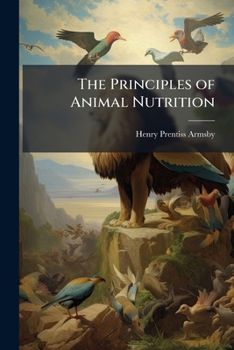The Principles of Animal Nutrition
Select Format
Select Condition 
Book Overview
The Principles of Animal Nutrition, by Henry Prentiss Armsby, presents a comprehensive overview of animal nutrition as understood at the beginning of the 20th century. This work delves into the chemical composition of animal bodies and feedstuffs, exploring the transformation of matter and energy within the animal. Armsby meticulously examines the processes of digestion, absorption, and metabolism, offering detailed insights into the role of various nutrients in maintaining animal health and productivity.
This book provides a valuable historical perspective on the development of nutritional science. It covers topics such as the determination of energy values of feeds, the computation of rations, and the practical application of nutritional principles to the feeding of different types of livestock. Though scientific understanding has advanced since its original publication, "The Principles of Animal Nutrition" remains a significant resource for understanding the foundations of modern animal nutrition and agricultural practices.
This work has been selected by scholars as being culturally important, and is part of the knowledge base of civilization as we know it. This work was reproduced from the original artifact, and remains as true to the original work as possible. Therefore, you will see the original copyright references, library stamps (as most of these works have been housed in our most important libraries around the world), and other notations in the work.
This work is in the public domain in the United States of America, and possibly other nations. Within the United States, you may freely copy and distribute this work, as no entity (individual or corporate) has a copyright on the body of the work.
As a reproduction of a historical artifact, this work may contain missing or blurred pages, poor pictures, errant marks, etc. Scholars believe, and we concur, that this work is important enough to be preserved, reproduced, and made generally available to the public. We appreciate your support of the preservation process, and thank you for being an important part of keeping this knowledge alive and relevant.
Related Subjects
Engineering Nature Science Science & Math Science & Scientists Science & Technology Technology




